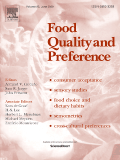New paper: Contrasts and ambivalences in French parents’ experiences regarding changes in eating and cooking behaviours during the COVID-19 lockdown.

From March until May 2020, a first strict lockdown took place in France to limit the spread of the highly contagious coronavirus SARS-CoV-2. Schools were closed and working from home was enforced, which had a profound impact on families’ habits. ESR7, Kaat Philippe, and her colleagues conducted a study with 498 French families to investigate the possible impact of the lockdown on families’ eating and feeding habits.
Their study consisted of two parts: there was a quantitative part aiming to map the changes in families’ food-related habits*, and a qualitative part aiming to explore how parents experienced these changes. For this qualitative part, Kaat and her colleagues used three open questions in an online survey: they asked parents of children aged 3-12 years to describe (1) which food-related changes they perceived as positive during the lockdown, (2) which changes as negative, and (3) which changes they would like to maintain after the lockdown.
The results revealed that parents appreciated the choice of more local and fresh foods during the lockdown, the time to prepare food (home-made dishes, new recipes) and cooking and eating together with the family. However, some parents – mostly mothers – also pointed out that is was sometimes a burden to prepare all these additional meals. On the negative side, parents described that their family consumed more unhealthy, palatable foods and expressed weight concerns. Mothers also struggled with the family’s temptation to eat constantly or unhealthy during the lockdown. As a response to the third question, parents described that they would like to maintain their choice of local, fresh foods, and to continue spending more time together around food. However, they doubt the feasibility of this intention due to a lack of time after the lockdown.
In sum, the open questions in this study gave French parents the opportunity to share their personal experiences about the impact of the lockdown on eating habits in their family. The results are interesting because they tell us what facilitates positive changes in eating habits and what the main barriers are (time!). This can help us to figure out ways to stimulate healthy eating and cooking behaviours in families.
The paper is published in Food Quality and Preference:
Philippe, K., Issanchou, S., Monnery-Patris, S. (2022). Contrasts and ambivalences in French parents’ experiences regarding changes in eating and cooking behaviours during the COVID-19 lockdown. Food Quality and Preference, 96, 104386 https://doi.org/10.1016/j.foodqual.2021.104386
*For more information about the quantitative part of this study, see:
https://edulia.eu/new-paper-child-eating-behaviors-parental-feeding-practices-and-food-shopping-motivations-during-the-covid-19-lockdown-in-france-how-did-they-change/
covid-19, Eating behaviors, emotions, ESR7, Families, gender differences, qualitative research

